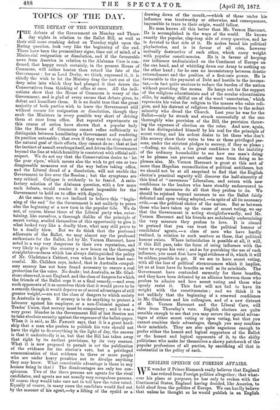TOPICS OF THE DAY.
THE DEFEAT OF THE GOVERNMENT.
At the same time, we are inclined to believe this "begin- ning of the end " for the Government is not unlikely to prove also the beginning of a new turn in the popular tide. We do not, of course, blame those of the Liberal party who, enter- taining, like ourselves, a thorough dislike of the principle of secret voting, availed themselves of this opportunity to give it what looked very like a deadly blow, what may still prove to be a deadly blow. But we do think that the professed adherents of the Ballot, we may almost say the professed enthusiasts for the Ballot, led by Mr. Vernon Harcourt, have acted in a way very dangerous to their own reputation, and very likely to give the country a new lesson on the thorough straightforwardness which has always distinguished the policy of Mr. Gladstone's Cabinet, even when it has been least suc- cessful. Mr. Childers says, indeed, that in Australia compul- sory secrecy has not been found necessary to ensure a real protection for the voter. No doubt; but Australia, as Mr. Glad- stone observed, is not England, and the class of dangers for which the friends of the Ballot urge it as a final remedy,—and even such opponents of it as ourselves think that it would prove to be a remedy, though it would deprive us of moral advantages of still greater weight,—are not the class of dangers to which society in Australia is open. If secrecy is to do anything to protect a labourer against his employer, or a non-Unionist against a Trades' Union, that secrecy must be compulsory ; and it was a very great blunder in the Government Bill of last Session not to take absolute security against the exposure of the ballot-paper. When it is said, as Mr. Fawcett says, that it is a great hard- ship that a man who prefers to publish his vote should not have the right to do everything in the light of day, the answer is that it undoubtedly is so, but that the Bill has taken away that right by its earliest provisions, by its very essence. What it is now proposed to permit is not the publication of the evidence for the elector's vote, but a privileged communication of that evidence to three or more people who are under heavy penalties not to divulge anything they may know. What conceivable advantage is there to any human being in that ? The disadvantages are only too con- spicuous. Two of the three persons are agents for the rival candidates, and agents are not usually very scrupulous persons. Of coarse they would take care not to tell how the voter voted. Equally of course, in many cases the candidate would find out by the manner of his agent,—by a lifting of the eyelid or a
drawing down of the month,—which of those under his influence was trustworthy or otherwise, and consequences, impossible to trace to their origin, would follow.
No man knows all this better than Mr. Vernon Harcourt.
He is accomplished in the ways of the world. He knows exactly the popular, clap-trap side of every question, and he
openly resist it. This fact will not fail to have its weight with the constituencies ; and we think it is not unlikely that the beginning of a renewed confidence in Mr. Gladstone and his colleagues, and of a new distrust of Mr. Vernon Harcourt and the Liberal Cave, will date from Thursday's vote. English electors. are quite sensible enough to see that you may secure the special advan- tages of either secret voting or open voting, but that you cannot combine their advantages, though you may combine their mischiefs. They are also quite sagacious enough to prefer either the honest and logical supporters of the Ballot or the honest and logical opponents of it, to the shifty politicians who make for themselves a showy patchwork of the popular professions of all parties, by sacrificing all that is substantial in the policy of each.


































 Previous page
Previous page